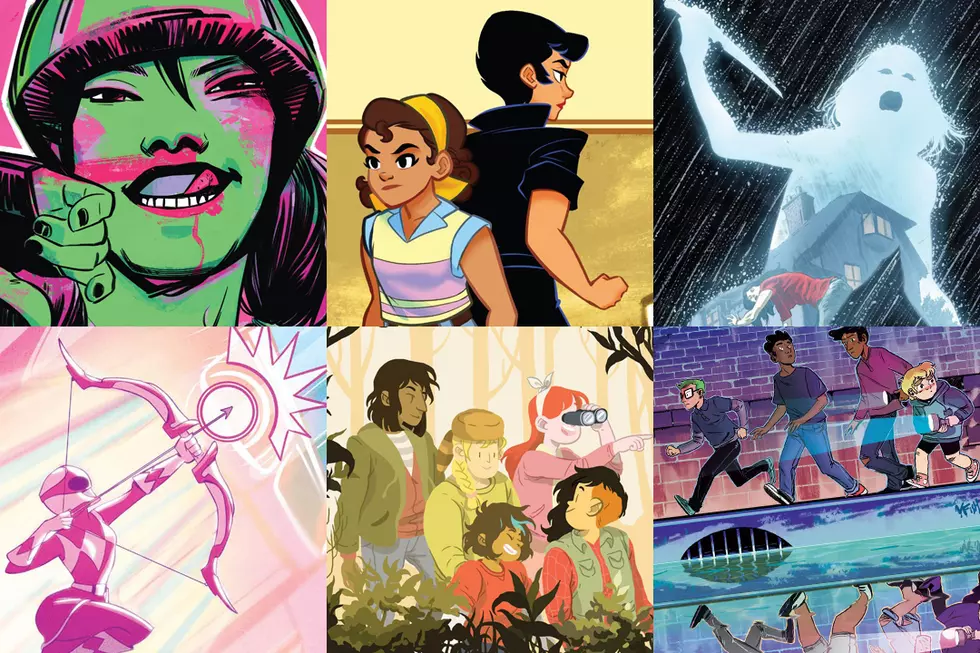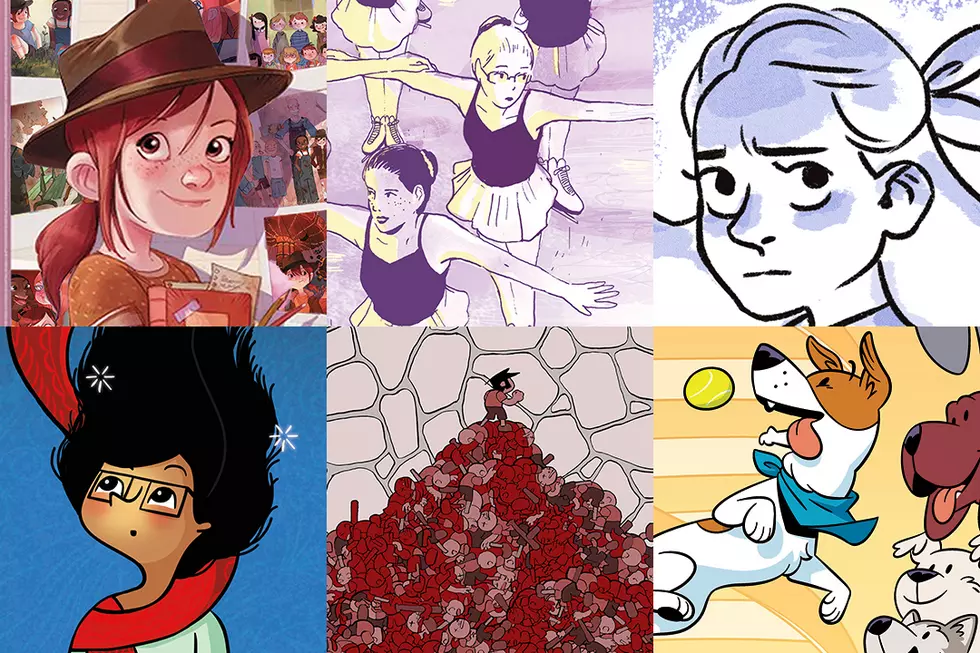![Children’s Holmes: Roger Langridge and Andy Hirsch Introduce the ‘Baker Street Peculiars’ [Exclusive]](http://townsquare.media/site/622/files/2015/11/BakerStreetPeculiars_001_Cover-A_Hirsch-1.jpg?w=980&q=75)
Children’s Holmes: Roger Langridge and Andy Hirsch Introduce the ‘Baker Street Peculiars’ [Exclusive]
Sherlock Holmes is surely one of the most versatile characters in fiction; he can be updated, reinvented, pitted against vampires, or reimagined as a mouse, and still the essential qualities of the great detective endure. That's even true in stories where Sherlock Holmes isn't Sherlock Holmes, and that's an idea that Roger Langridge and Andy Hirsch will explore in their upcoming all-ages adventure series The Baker Street Peculiars, from Kaboom, unveiled exclusively here on ComicsAlliance.
In the Baker Street Peculiars, there is no Holmes; the real brains of the operation is his supposed housekeeper, Mrs Hudson. With too many cases to solve, she's brought in some new help in the form of three precocious kids and a dog, for what promises to be a wonderful all-ages action comedy. Roger Langridge, who usually provides his own art for books like Fred the Clown and Abigail and the Snowman, is providing the scripts this time around, joined by artist Andy Hirsch, best known for his work on Adventure Time and his all-ages Western Varmints. Langridge and Hirsch spoke to ComicsAlliance about working together, the idea for the series, and what makes Sherlock Holmes so iconic.
Comics Alliance: Where did the idea come from to reimagine Sherlock Holmes as Mrs. Hudson in disguise?
Roger Langridge: The initial idea was to give the kids, and by extension the readers, a mystery to solve; it just seemed like an interesting twist to throw at them after they thought they'd sorted everything out, and – given the attitudes of the period – it created some tension, some potential obstacles to overcome, for future stories. My initial outline didn't reveal Homes' true identity until the very end of the series. But there was an editorial note after I wrote the first issue suggesting that we move the revelation to the first issue. I was initially reluctant to do that – after all, what's a Sherlock Holmes story without a mystery to solve? – but on reflection, I thought we gained more from the "Sherlock is a woman" hook than we lost by losing the mystery, so I went with it. It makes The Baker Street Peculiars more of its own thing from the outset, which is a definite plus.
CA: What can you tell us about the kids that make up the Peculiars?
RL: They're all from different backgrounds and different social classes, but they all have one thing in common: they lack a proper sense of family, either through being orphaned or simply by being estranged from their actual parents.
We've got Molly, a tough-minded Jewish girl who has aspirations to become a detective, who lives with her shopkeeper grandfather; Rajani, a street thief of Bangladeshi heritage, who's recently lost the only father-figure she ever knew; and Humphrey, an upper-class boarding-school kid who barely ever sees his parents and only has his dog, Wellington, for companionship. They all need to feel like they belong in some way or another when circumstances (and a mutual proclivity for night-time adventures in 1930s London!) throw them together.
Andy Hirsch: This variety of backgrounds needs to come through in the characters' designs and especially their acting. Molly is the most enthusiastic of the bunch, always leading the pack despite her short legs; Rajani is guarded and skeptical, hard to get a smile out of, but confident in her actions; Humphrey is new to so much, he grins as if nothing could have any consequences and is shocked, shocked, when things go wrong; Wellington is a professional, but not so much that he can hide his canine tendencies entirely. And of course their personalities interact in different ways as their adventures get more and more peculiar.
Q: Sherlock Holmes must be one of the most enduringly reinvented characters in fiction. Why do you think that is?
RL: I think there are several reasons. One obvious one is that he's in the public domain; so a lot of the obstacles that would prevent somebody from reinterpreting, say, Flash Gordon simply aren't there for Sherlock Holmes. The biggest reason, though, is that he's just such a strong character to begin with; he's unique enough and iconic enough that you can throw any number of reinterpretations at him and yet he still remains recognizably Sherlock Holmes. And he has that great thing that a lot of iconic characters have, in that you rarely get into his head; you're usually seeing him from someone else's point-of-view, so it's easy to project whatever you want onto him. As a consequence, he's endlessly reinventable.
AH: Plus, the Sherlock Holmes canon is absolutely peppered with allusions to cases and characters that Doyle never directly addresses. There's a sense that his stories are just the tip of the iceberg that is Holmes's career, leaving the rest of us limitless area in which to expand. A throwaway line about the detective having been employed by some Lord, Lady, or another is fodder for a whole story by a future creator.
CA: Andy, you're working from the scripts of an exceptional humor artist in Roger. Is that a little daunting?
AH: I've found it a wonderful opportunity. It helps that in addition to being tremendously good at his job, Roger is gracious and supportive. Of course, I've long been a big fan of his, so yes, daunting is still the word. I'll often think, "now how would Roger draw this?" while reading his scripts, but knowing that we share a similar comedic sense keeps me comfortable with the storytelling choices I end up making.
Q: And Roger, what's it like to write comedy for another artist?
RL: I'm enjoying it. It helps that Andy's a skilled humour cartoonist in his own right, so he gets the kind of rhythms I'm going for without me having to spell things out overmuch — and he's great at the character bits, which is about 80% of the battle. It's been a real pleasure so far.
Q: How did the two of you come together? What convinced you that you were the right fit?
RL: I came to Andy's work as a fan to begin with. The first work of his I saw was the Slave Labor series he did with Tommy Kovac, The Royal Historian of Oz. I was really impressed with the cartooning on that, so I checked out his website, and he had a thing on there which he was self-publishing called Varmints, which he wrote and drew himself, which I thought was absolutely great. I think I wrote him a fan letter or something — or maybe he wrote to me about something, I can’t remember now. Anyway, we've kept in contact every so often ever since.
As for Andy being a good fit for the Peculiars, I knew from Varmints that he could do period research and integrate it into a fun, energetic, immediate-feeling story, so it seemed well within his capabilities. His designs on this book have been spectacular – in particular, his rendition of our main villain is about a thousand times better than I imagined.
AH: No, no, it was definitely me writing that fan letter. I owe Roger an awful lot for his support over the years — from a kind word to a note of introduction — and asking me to collaborate with him is yet another tally to add to that column. Though we did share some pages back in Garfield's Nine Lives, so maybe this is our second project together.
Obviously I was game to work on anything with Roger, and the Peculiars in particular has lot of elements that I enjoy. We've got a team of kids (and dog!), breakneck action, physical comedy, loads of atmosphere, and I love drawing those 30's cars.
CA: What's the secret to telling a great all-ages story?
RL: I don't know if it's esoteric enough to qualify as a "secret" — everybody says this! — but I think the key is to write something you'd want to read yourself. Which is common sense, really; if you're bored by what you're writing, a child with a fraction of your attention span will have disappeared by page three.
I feel like a really important element is to keep things moving — not physically, necessarily (although physical action works really well, of course), but narratively; not allowing the forward momentum to slacken is super-important for kids... and, wouldn't you know it, that works great for adults as well! I think if you can master writing for all-ages audiences it makes you a better writer, period, because kids won't let you get away with a whole lot of waffle. You have to get right in there and tell that story!
AH: I find a focus on readability extra important, though that should be a priority regardless of the audience. I prefer to keep things pretty straightforward anyway. I suppose I try to draw the sorts of things young Andy would have liked to look at (and current Andy stills does, really) — lots of little details and jokes, everything in a scene interacting in some way. No secret, just fun.
Baker Streett Peculiars #1 goes on sale March 2016, from Boom Studios' Kaboom imprint.
More From ComicsAlliance







![Dynamite Announces New ‘Betty Boop’ Series From Langridge And Lagace [SDCC 2016]](http://townsquare.media/site/622/files/2016/07/Boop01.jpg?w=980&q=75)

